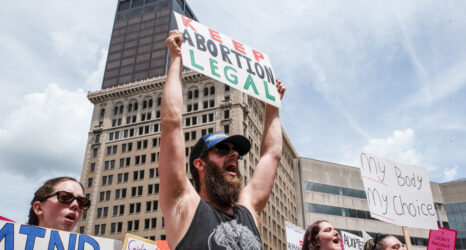It’s not too late to make a difference in your community.

With just days till the election, and millions of ballots already cast, many are searching for last-minute ways to get out the vote. Activists and organizers are here to say: It’s not too late to make a difference in your community.
What is Vote Tripling?
“When you vote triple, you either text or call or DM your friends on social media, and remind them to make their own vote plan,” Nicole Taylor, senior manager at the Andrew Goodman Foundation, told Ms.
It’s a small action—but one that can have a reverberating impact.
“Vote tripling is so important because one of the most effective organizing strategies is to utilize relational organizing—engaging your friends, your peers, your family, your neighbors. Because they know you—you have relationships with them, you’re a trusted source. And that makes them that much more likely to actually turn out and vote.
“If you then encourage them to reach out to three folks in their network, and it keeps going on, then you’ll end up impacting hundreds of voters.”
Voters can even volunteer with organized efforts locally to engage in “polling place vote tripling”—speaking to voters as they leave polling places (from a COVID-safe, six-foot masked distance, of course), and encouraging them to contact three friends or family members to make sure they’re voting.
(See this document for more information on vote tripling including FAQs and more. You can also find volunteer events near you here.)
What Else Can People Do to Help Get Out the Vote?
Beyond vote tripling, there are still ways for concerned voters to ensure the election goes as smoothly as possible.
Within their own communities, people can volunteer to hold space in line for those who may not be able to stand for the potential multiple hours of waiting it might take to vote. If you’re in a state that is experiencing long wait times, it’s a real opportunity to help out.
That said, despite some polling locations reporting long lines, most—70 percent—of those who have already voted in-person say they waited less than 30 minutes to vote. Another 18 percent said it took them between 30 minutes and an hour. Only 9 of voters said they waited between one and two hours, and just 3 percent said voting took longer than two hours.
Those who do face long lines are able to make full use of their time through programs like Joy to the Polls, a nonpartisan group of artists who perform for voters waiting in line in Philadelphia.
Other initiatives, like Pizza to the Polls, aim to keep voters fed while they endure long lines by sending pizzas to locations reporting excessive waits. Election Defenders will also be present at many polling places to provide personal protective equipment and maintain voters’ sense of safety in the event of intimidation.
Nonpartisan organization Election Protection offers volunteer opportunities for both legal professionals and everyday people to provide advice and be poll monitors. The organization also runs a hotline—(866) OUR-VOTE, with hotlines in other languages on their website—that anyone can reach out with any questions or problems in the voting process.
With the growing role of social media in elections in mind, the organization Common Cause has enlisted over 500 volunteer social media monitors, who are trained to spot and flag mis- and disinformation, and to identify voter questions and answer them by directing them to trusted sources.
But while it may be a major source of misinformation, social media has a immense capacity to do good, too, says Taylor.
“Everyone is an influencer within their own sphere,” she said—meaning vote tripling and outreach over social media can make a very real difference.
Voting in Community
But beyond organized volunteer opportunities, advocates are emphasizing the importance of being engaged within one’s own community.
“It’s important to talk to your community. If your mother, father or friend isn’t engaged, then talk to them and engage them on the issues, and help them figure out the best way to make a plan to vote,” said Sylvia Albert, who the director of voting and elections with Common Cause.
“The reality is, peer pressure does work! And it can be used in a positive way here to engage more voters in the process that may have previously been more apathetic.”
With this in mind, Common Cause encourages volunteers to stay in their own states, emphasizing the fact that no matter where one lives, there are likely immense problems facing voters—and that organizing is most successful within one’s own community and relationships.
And for these previously apathetic voters, who may not be registered still, there’s still hope: 21 states and the District of Columbia offer same-day voter registration.
For those looking for a glimmer of hope in an election that’s been rife with voter suppression, organizers point to the recent hopeful mass-mobilization around voting.
“Normally we get 6,000 volunteers. This time, so far we have upwards of 40,000 volunteers,” said Albert. “It shows real interest and desire by the American people to ensure a free, fair and safe election.”
You may also like:





